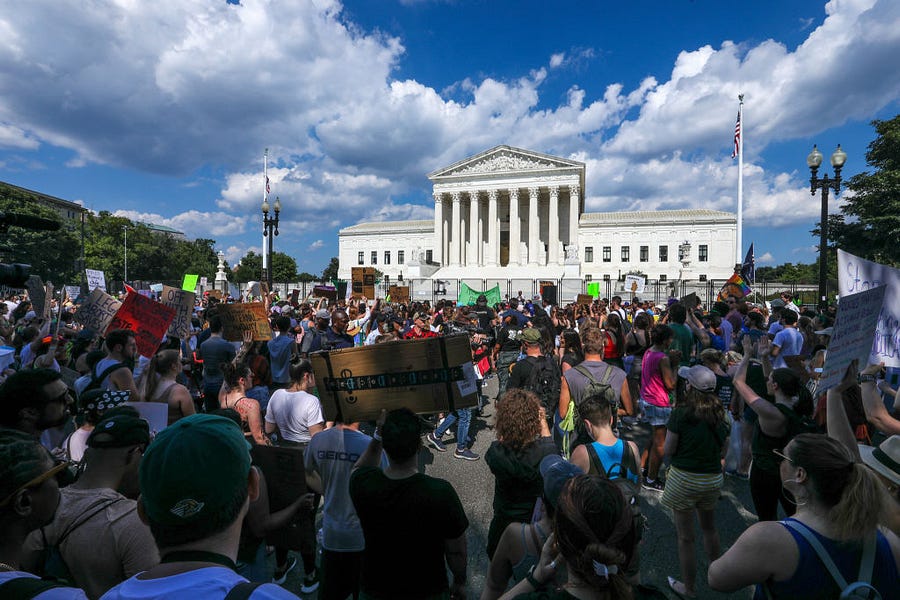Hello. I hope you are having a good weekend. The moment that many had hoped and prayed for, and that many others feared, came to pass on Friday when the Supreme Court handed down its decision in Dobbs v. Jackson Women’s Health Organization. Roe v. Wade is no more.
Sometimes, major events are sudden, surprising, and dramatic: The pandemic became real on one night in March 2020 when, almost simultaneously, Tom Hanks announced he had COVID and the NBA shut down after a player named Rudy Gobert tested positive. I can recall the surreal feeling that overcame me when hordes of protesters took over the Capitol on January 6, and the dread I felt on February 24 when images of explosions in and around Kyiv took over news broadcasts.
The Dobbs decision will go down as a significant event in our country’s history, but—even though this result was telegraphed when Justice Samuel Alito’s draft opinion was leaked last month—it’s something that needs a little time to sink in. That’s not to say it didn’t have an immediate effect. Abortion-rights supporters are protesting around the country. Some states still have abortion bans from before Roe that are now back in effect, and others had passed “trigger bans”—laws that would go into effect were Roe to be overturned. (This NPR article is useful for sorting out which states have such laws.) The Washington Post published a story about a Texas clinic that stopped performing abortions the minute the decision came down, turning away women who’d been in the waiting room.
I say that it needs time to sink in because it will take time to see how some aspects play out. As many—including Ruth Bader Ginsburg—have noted, Roe v. Wade made the abortion debate more contentious. Returning the matter to elected officials might prompt a more serious debate, but probably not right now while tempers are flaring.
Many pro-lifers rejoiced at the decision. I could only feel conflicted. As I wrote when the Alito draft was leaked: “Abortion is a complex, emotional issue because it deals with rights that are invariably at odds: a woman’s right to control her body and the (harder-to-define) rights of a separate but wholly dependent not-yet-born child.” Now that Dobbs has been handed down, in many states the balance has shifted in favor of the unborn. But there is a real cost for women, and it’s dishonest to ignore that.
David, unsurprisingly, wrote about Dobbs in his Sunday French Press, and he tackled this difficult topic more eloquently than I could hope to:
The two sides of the great American divide are now staring at each other and asking, “Now what?” The answer from pro-life America should be clear and resounding—the commitment to life carries with it a commitment to love, to care for the most vulnerable members of society, both mother and child.
It’s not enough to be happy that Roe v. Wade has been overturned, or that babies who might have been aborted will now be born. It’s incumbent upon all of us to create a culture in which children aren’t just born but welcomed, and they and their families have the necessary support to thrive.
Now, onto our best work from the week. Thanks for reading.
Grab a very large cup of coffee and settle in. This will be worth your time. Haley did extensive reporting on the passage of the Uyghur Forced Labor Prevention Act when it passed late last year. She has spent the intervening months interviewing the lawmakers and staff that made it happen, and human rights activists who pushed for its adoption. Haley details how corporations like Coca-Cola pushed back against the legislation and how China pushed back against companies who stopped doing business in Xinjiang. She also looks at how the Biden administration resisted early on because it saw Xinjiang as an important source of polysilicon, a component of solar panels, and cutting ties would hamper its climate policy goals. In later installments, she explains the frustrating delays and back and forth attendant with pushing such sweeping and contentious legislation and concludes by pointing out how the government is still not doing enough to help Uyghurs who’ve managed to escape. Members can find the whole project in one document here.
It’s become commonplace on the right to describe various proceedings against Donald Trump and his supporters–the impeachment trials, the criminal cases against the January 6 participants, and now the January 6 hearings—as a show trial. Jonah is not having any of it. He details how Stalin used show trials to execute his enemies and anyone he deemed a threat: inventing evidence, forcing confessions, threatening family members, etc. He then lays out all the reasons why none of the proceedings that Trump supporters complain are obviously nothing like a real show trial, and he dismisses the suggestion that it’s just overheated rhetoric. “This is an especially important point for conservatives,” he writes. “We spent decades arguing that Soviet crimes were at least in the same moral ballpark as Nazi crimes. Now, for many conservatives, the central crimes of Stalinism amount to a toothless committee because it’s not bipartisan enough.”
The left and right have demonstrated an unwillingness to crack down on the bad actors within their own movements, and in the French Press ( 🔐) David notes that we are all worse off for it. He calls attention to the violent riots that evolved from the George Floyd protests and the threats against conservative Supreme Court justices before calling out the Trump supporters who threatened Republican state officials who were unwilling to help steal the election and even local election workers who were targeted in disinformation campaigns. “America is in a dangerous place. And every single instinct that tells us to excuse, minimize, or rationalize our own side’s misconduct—for fear of giving them ‘ammunition’ in the culture war—pushes us closer to the abyss. There is no substitute for moral courage in this moment, and there is no better way to start than by standing athwart your own side’s extremism and yelling stop.”
And now for the best of the rest:
-
It ended up not being the biggest case of the week, but the Supreme Court’s decision in Carson v. Makin was significant nonetheless, and a significant victory for school choice. The court ruled that Maine’s unusual tuition voucher program (many public districts have no secondary schools, so the state covers private school) could not exclude faith-based institutions.
-
Jay Nordlinger calls out the professional golfers who are jumping to the LIV Tour, which is backed by the sovereign wealth fund of the Saudi government. He describes the Saudi’s move as “sportswashing” whereby bad actors try to clean up their reputations through involvement in sports” and reminds readers of the kingdom’s human rights abuses.
-
As Ukraine settles into what is looking like a long war with Russia, Giselle Donnelly notes that Western Europe is not doing enough to help Ukraine and prevent a wider threat from Russia and argues that only the United States is equipped to offer the extensive support Ukraine needs.
-
In Stirewaltisms ( 🔐), Chris Stirewalt tries to warn Democrats that it’s a bad idea to back the primary campaigns of extremist Republicans who they think will be easy pickings in the general election. “Former President Bill Clinton famously encouraged his friend Trump to run for the Republican nomination in 2016, no doubt believing it would help Clinton’s wife’s chances.” How did that work out?
-
Who’s to blame for high gas prices: Joe Biden? Vladimir Putin? The issue is too complex for a bumper sticker. Scott Linciome breaks it all down in Capitolism ( 🔐).
-
On the campaign trail, Joe Biden called Saudi Arabia a pariah for its human rights abuses. Now that gas prices are up over $5 a gallon, though, he’s realized the value of good relations with one of the biggest oil exporters in the world. Charlotte previews Biden’s visit to the kingdom next month.
-
On the pods: We excused David and Sarah from the weekly Friday editorial meeting so they could record this emergency edition of Advisory Opinions about Dobbs. Don’t miss it. Christine Rosen joins Jonah on The Remnant for a discussion about kids and social media, the rapid rise of transgender ideology, and how trauma became a political tool. On Good Faith, David and Curtis Chang tackle thorny questions for Christians—both pro-life and pro-choice–now that Roe is gone. And on The Dispatch Podcast, the gang discusses a range of subjects, including a possible gas-tax holiday and what the January 6 committee has been up to.







Please note that we at The Dispatch hold ourselves, our work, and our commenters to a higher standard than other places on the internet. We welcome comments that foster genuine debate or discussion—including comments critical of us or our work—but responses that include ad hominem attacks on fellow Dispatch members or are intended to stoke fear and anger may be moderated.
You are currently using a limited time guest pass and do not have access to commenting. Consider subscribing to join the conversation.
With your membership, you only have the ability to comment on The Morning Dispatch articles. Consider upgrading to join the conversation everywhere.